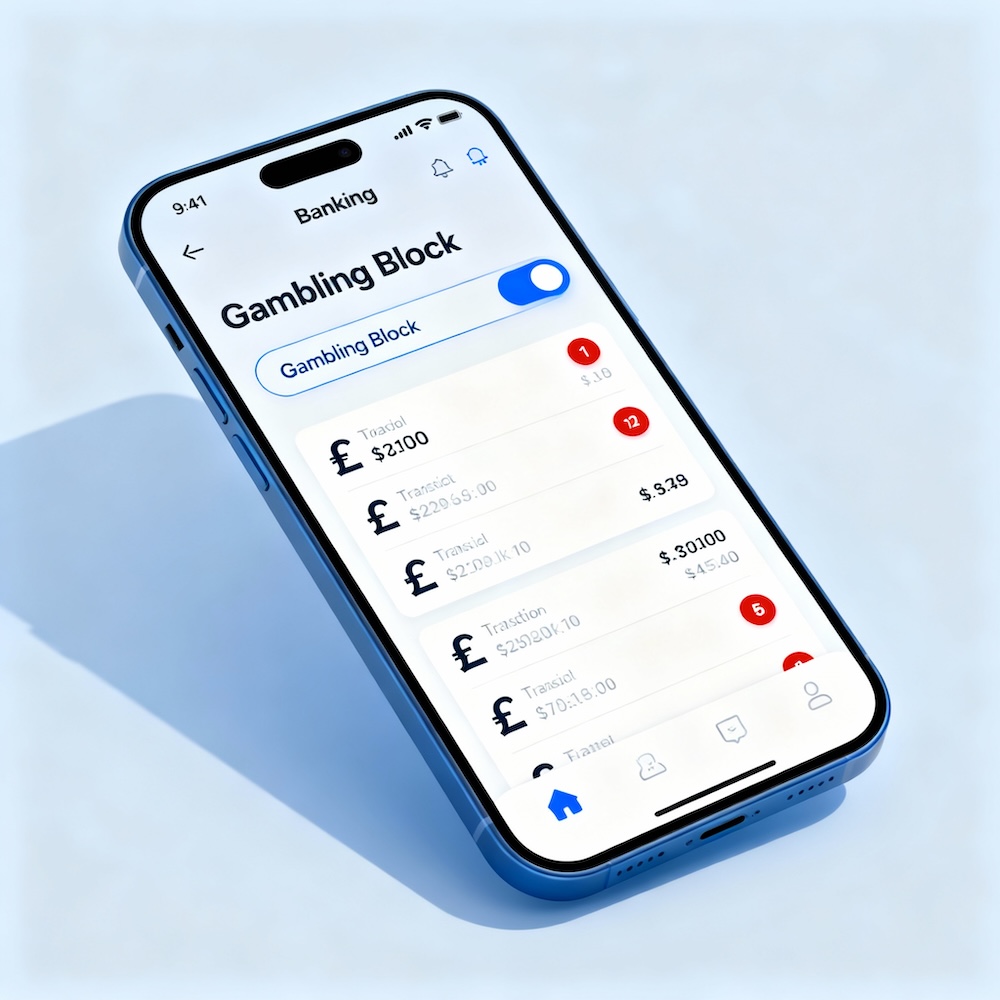How Do You Actually Unblock Gambling on Monzo?
It’s half eleven on a Wednesday and I’m staring at my phone trying to work out how long I’ve got left on this cooldown period. Six months? Seven? I set the gambling block back in April after a particularly grim weekend backing horses that couldn’t run if their lives depended on it, and honestly I can’t remember if I picked the maximum year or something shorter. The app doesn’t tell me how much time is left either, which feels deliberate.
Right, so here’s what I’ve learned about getting this thing off your account – both the official route and the ways people actually do it when they can’t be bothered waiting.
List of Non Gamstop Casinos with Friendly Payments
What’s the actual removal process on Monzo step by step

Open Monzo’s app. Tap Account at the bottom. Scroll to Limits & Controls. Find Gambling Block. Toggle it off.
Except it’s not that simple, is it.
First thing that happens: they show you the note you wrote to yourself when you set it up. Mine says something embarrassing about needing to “get my priorities straight” which felt profound at 2am but now just makes me cringe. Eight and a half thousand customers have written these messages to themselves as of December 2024 data, so I’m in good company at least.
Then comes the cooldown. Two days minimum, twelve months maximum. You picked this when you first activated the block and now you’re stuck with it. There’s no fast-track option, no “I’ve changed my mind” button that works immediately. The whole point is friction – making you wait so you can’t act on impulse.
If you’ve ever chatted to their support team about gambling problems before – even just mentioned it in passing – you need to speak to them again before they’ll lift the restrictions. They’ll ask things like “Has your situation changed since you first switched on the restrictions?” which is meant to make you think properly about what you’re doing. That conversation can take anywhere from ten minutes to half an hour based on what people report online.
After all that? You still wait out the full cooldown period.
How long am I actually waiting here
Depends what you chose originally. Seventy-five percent of users pick 48 hours, which is bearable. Forty-one percent go for the full year. Yeah, those numbers don’t add up to 100 – people can change their cooldown period settings, though you have to wait out your current cooldown first before making any changes.
The average cooldown period has jumped to ten months since they updated the feature in September 2023. Used to be three months before that. I think the “note to future you” thing and the longer maximum period pushed people towards setting stricter limits on themselves.
Best case: two days if you picked the minimum and haven’t flagged yourself as someone with gambling issues to their support team.
Worst case: a full year plus however long that awkward conversation with customer support takes.
I’ve seen people on Reddit ask if they can just close their account and open a new one to skip the wait. Technically yes, but they’ll ask why you’re closing it and if you admit it’s to dodge the gambling block they might refuse. Plus you lose everything – direct debits, payment history, your account number that’s registered everywhere. Messy.
Does this Monzo block actually catch every gambling transaction
No, and this is where it gets frustrating.
Monzo works by reading merchant category codes – little tags attached to every card transaction that say “this is a supermarket” or “this is a gambling site”. When the bank sees a gambling code, it declines the payment before it goes through. Simple enough.
Except some gambling companies don’t tag their transactions properly. Maybe they’re sloppy, maybe it’s deliberate – either way, payments slip through. When that happens you can report it and they’ll manually add that specific merchant to the block list, but your money’s already gone.
The Financial Ombudsman dealt with exactly this situation in early 2026 – case reference DRN-5489113 if you want to look it up. Someone had the block active since November 2024 but gambling payments were still processing. The Ombudsman ruled that the bank had done everything right; it was the merchants using wrong codes. Bank wasn’t liable for the losses.
Cold comfort when you’re watching money disappear that the block was supposed to stop.
What about e-wallets – do they actually work as a workaround
Yeah, they do.
PayPal, Skrill, Neteller – none of these trigger gambling merchant codes when you fund them from your card. The transaction shows up as “payment to PayPal” or whatever, not as gambling, so the block doesn’t activate. Then you use the e-wallet to deposit at casinos.
Withdrawals go back to the e-wallet first, then you transfer that balance to your bank account. Again, not coded as gambling, so it goes through fine.
This isn’t some secret loophole I’ve discovered. A 2020 research paper on bank gambling blockers specifically mentioned that “paying via an e-wallet, such as Paypal or Skrill” was a known workaround. The bank knows it happens. They can’t really stop it without blocking legitimate e-wallet usage entirely, which would annoy millions of customers who use PayPal for normal shopping.
Crypto works too but it’s riskier. Buying Bitcoin or whatever through Coinbase shows up as cryptocurrency purchase, not gambling. Thing is, UK-licensed casinos can’t accept crypto deposits anymore – that rule came in on 31st January 2024. So you’d be playing at offshore sites without UK Gambling Commission oversight, no Financial Ombudsman to complain to if they refuse to pay out. Your call whether that’s worth it.
Can I speed this up if my circumstances have genuinely changed
No.
Even if you set Monzo’s block during a rough patch and you’re genuinely in a better place now – new job, relationship sorted, whatever – you still wait out the full cooldown. The customer support conversation might cover why things have changed for you, but it doesn’t shorten the waiting period.
The system is designed to be annoying on purpose. Kate Graham, who’s their Vulnerability Manager, said in December 2024 that they built these features by “staying close to our customers” and hearing feedback. The data shows it’s working – they blocked £9 million in gambling transactions throughout 2024, averaging £800,000 per month, which is a twenty percent jump from 2023’s monthly average of £657,000.
Over 700,000 customers are using this feature right now. Less than ten percent of people who activate it ever turn it off permanently, based on 2022 data. That’s either because it’s genuinely helping them stay away from gambling, or because the removal process is such a pain that they give up and just use workarounds instead.
Probably a bit of both.
What if I just need to withdraw winnings I’ve already got sitting at a casino
The block only stops outgoing payments to gambling sites, not incoming money from them.
If you’re trying to withdraw winnings, that should come through as a normal bank transfer or card refund. Community forum discussions mention that “payments from gambling sites can take a little longer crediting” to the account, but there’s nothing about the block stopping them entirely.
Timing might be slower than usual though. Not sure why – maybe extra security checks or something.
Are there other UK banks that don’t have these blocks
Not really.
About ninety percent of UK banks now offer gambling blocks because everyone copied this feature after the bank pioneered it in 2018. Barclays has one. NatWest, HSBC, Lloyds – they’ve all got versions of this.
The difference is how easy they make it to turn off. Other banks might not have the same friction-heavy removal process – no mandatory cooldowns, no awkward conversations with support teams. But I haven’t verified that for every bank and each one’s implementation is different.
If you need unrestricted gambling access right now, opening a fresh account with a different bank that doesn’t have a block set up is more straightforward than trying to lift this one. Or just use the e-wallet workaround.
Why make it this deliberately difficult in the first place
Because gambling decisions are often impulsive.
The bank launched this back in 2018 after customers specifically asked for help controlling their gambling spending. First friction-based banking tool of its kind. The idea is to create barriers between “I fancy a bet” and actually being able to place one.
They worked with GamCare – that’s a gambling support charity – to develop the current version. The September 2023 improvements came directly from feedback and collaboration with vulnerable customers. Longer cooldown options, the reminder message feature, better access to specialist support.
The cooldown forces you to wait. The note you wrote to yourself makes you remember why you set the block up. The conversation with customer support (if needed) makes you articulate out loud why you want to lift it. All these little bits of friction add up, giving you time and space to work out whether you actually want to gamble again or if you’re just bored on a Wednesday night.
Data backs it up – average cooldown periods have tripled to ten months since the updates. £9 million blocked in 2024. Over 700,000 active users.
Whatever you think about the process being annoying, it’s clearly working for a lot of people.
Does the bank actually refuse to remove it if I really insist
Not exactly refuse, but they make it harder.
If you’ve discussed gambling problems with their support team before, you have to talk to them again before they’ll process the removal. During that conversation they’ll ask questions meant to make you think through your decision. “Has your situation changed?” and similar.
I haven’t found evidence of them outright refusing to lift the block if someone insists after the cooldown ends and completes the conversation. The Financial Ombudsman cases I’ve looked at focus more on whether the block was applied correctly and whether the friction is justified, not on the bank refusing removal requests.
The Ombudsman sided with the bank in a November 2024 decision about the removal process being too difficult – ruled that the friction was appropriate and justified.
So legally, they’re covered.
What happens to the 10% who do manage to turn it off
No idea.
Less than ten percent of the 400,000+ customers who activated the block (as of 2022 data) have ever switched it off permanently. That stat doesn’t tell us whether they went back to controlled gambling, whether they relapsed, whether they just opened accounts elsewhere, nothing.
The average cooldown jumping from three months to ten months after the September 2023 updates suggests people are taking it more seriously now. The “note to future you” feature probably helps – 8,500 people have written these messages to themselves.
But once the block’s off? No follow-up data that I can find.
FAQs
Can I remove the gambling block instantly if I change my mind?
No – there’s a mandatory cooldown period between 2 days and 12 months depending on what you picked when setting it up, and there’s no way to speed this up. Even if you contact customer support, you still wait out the full cooldown. The block stays active until that period ends.
Do e-wallets like PayPal actually bypass the gambling block?
Yes – funding PayPal, Skrill or Neteller shows up as a standard purchase, not a gambling transaction, so the block doesn’t trigger. You can then use the e-wallet to deposit at casinos and withdrawals go back to the e-wallet first before transferring to your bank. A 2020 research paper on bank gambling blockers specifically identified this as a known workaround.
What happens if gambling transactions still go through despite the block being active?
The block relies on merchant category codes, so if a gambling company doesn’t tag transactions correctly they can slip through. You can report it and the bank will add that merchant to their block list, but they can’t reverse the payment that already processed. The Financial Ombudsman ruled in early 2026 (case DRN-5489113) that the bank isn’t liable for transactions that bypass the block due to incorrect merchant coding.
How many customers are currently using this gambling block feature?
Over 700,000 customers have activated the gambling block as of December 2024, and the bank blocked £9 million in gambling transactions throughout 2024 alone – that’s £800,000 per month on average. This represents a 20% increase from the £657,000 monthly average they were blocking in 2023. The average cooldown period customers choose is now 10 months, up from 3 months before the September 2023 feature improvements.
Can I close my account and open a new one to get around the gambling block?
The bank will ask why you’re closing your account, and if you admit it’s to bypass the gambling block they might refuse the closure. Even if they approve it, you lose all your direct debits, payment history, and account connections – opening an account with a different UK bank or using e-wallet workarounds is more straightforward.


